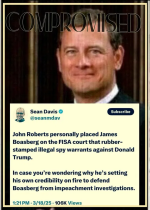You are using an out of date browser. It may not display this or other websites correctly.
You should upgrade or use an alternative browser.
You should upgrade or use an alternative browser.
judge's request for answers about deportation flights
- Thread starter volsrocks
- Start date
Number Six
I like big bots and I can not lie
The Constitution says the defendants have the right to examine evidence against us. If the evidence is top secret, they cannot examine it. Therefore, there is no evidence.All of the information the Judge requests should be classified ‘top secret’ National Security and since he doesn’t have clearance, tough cookies Judgie.
T. A. Gardner
Serial Thread Killer
It doesn't matter. The judge doesn't have jurisdiction. The deportees have been declared enemies of the United States and are being deported as such. It would be like the judge demanding that Japanese citizens in the US who were in the process of being deported after Pearl Harbor should be returned to the US so they can have their day in court.
Great, we can have you declared an enemy, and deport you.It doesn't matter. The judge doesn't have jurisdiction. The deportees have been declared enemies of the United States and are being deported as such. It would be like the judge demanding that Japanese citizens in the US who were in the process of being deported after Pearl Harbor should be returned to the US so they can have their day in court.
That bald headed chicken fucker can pound sand.All of the information the Judge requests should be classified ‘top secret’ National Security and since he doesn’t have clearance, tough cookies Judgie.
T. A. Gardner
Serial Thread Killer
Just a reductio ad absurdum fallacy there.Great, we can have you declared an enemy, and deport you.
Without habeas corpus, what is to stop us?Just a reductio ad absurdum fallacy there.
Into the Night
Verified User
That and the judge has no authority here at all.All of the information the Judge requests should be classified ‘top secret’ National Security and since he doesn’t have clearance, tough cookies Judgie.
Into the Night
Verified User
Trump never said any such thing. Fake News.
Into the Night
Verified User
To where, Wally? The United States???Great, we can have you declared an enemy, and deport you.
Into the Night
Verified User
There is no constitutional right for an illegal alien to remain in the United States, Wally. They are subject to deportation.Without habeas corpus, what is to stop us?
Dumb comment. The judge knowingly overstepped his authority.Great, we can have you declared an enemy, and deport you.
In the 1867 case of Mississippi v. Johnson, the Supreme Court ruled that it lacked jurisdiction to issue an injunction against President Andrew Johnson, preventing him from enforcing the Reconstruction Acts, as the President's actions were considered executive and political, not ministerial.
Here's a more detailed explanation:
- Background:
After the Civil War, Congress passed the Reconstruction Acts, which divided the former Confederate states into military districts and outlined the process for their readmission to the Union.
- The Case:
The state of Mississippi sought an injunction from the Supreme Court to prevent President Johnson and his officers from enforcing these acts, arguing they were unconstitutional.
- The Court's Ruling:
The Supreme Court, in a 9-0 decision, held that it lacked jurisdiction to issue such an injunction.
- Reasoning:
The Court reasoned that the President's duties in enforcing the Reconstruction Acts were executive and political, requiring discretion and judgment, rather than ministerial duties that could be subject to judicial oversight.
- Significance:
This case established the principle that the President, in the exercise of his executive powers, is not subject to judicial control or injunctions, reinforcing the separation of powers.
- Key Takeaway:
The Court recognized that judicial intervention in executive matters could lead to conflicts between branches of government and undermine the separation of powers.
trump is deporting people not from El Salvador to El Salvador, that means another president can deport you to where ever he or she wants... How long do you think you can live in Antartica?To where, Wally? The United States???
So we declare you an illegal alien, and then point out that you have no right to defend yourself.There is no constitutional right for an illegal alien to remain in the United States
WinterBorn
Verified User
It doesn't matter. The judge doesn't have jurisdiction. The deportees have been declared enemies of the United States and are being deported as such. It would be like the judge demanding that Japanese citizens in the US who were in the process of being deported after Pearl Harbor should be returned to the US so they can have their day in court.
Or they could be placed in internment camps. We've done that before.
Into the Night
Verified User
Never said he did, Wally.trump is deporting people not from El Salvador to El Salvador,
Nope. I happen to be a citizen.that means another president can deport you to where ever he or she wants...
Antarctica isn't the United States, Wally.How long do you think you can live in Antartica?
Into the Night
Verified User
'We'??? Just how many people do you think you are, Wally?So we declare you an illegal alien, and then point out that you have no right to defend yourself.
Into the Night
Verified User
Deportation isn't an internment camp.Or they could be placed in internment camps. We've done that before.

